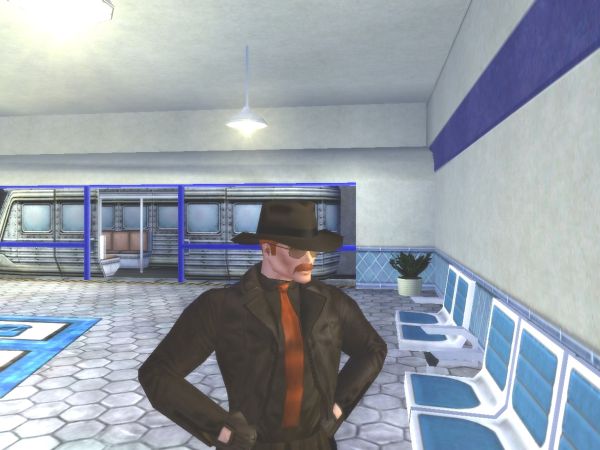Thursday 21 June 2007

|
Pic of the day: Not quite real life - Cashcow Boy, defender of conscious capitalism in City of Heroes. Hopefully he resembles someone you know. ^^ Can you hack Real Life?"The most important question about Real Life" said the muse in my head, "is whether it is stored on a central server or locally at each client." Massively multiplayer online games, including the (in)famous Second Life, generally have standardized on the same basic architecture: The program on each player's computer (the "client") stores images and sounds locally, but a central server stores vital data about the character ("avatar") and also its position relative to the world and other players' characters. That way you cannot hack into the data on your local computer and give yourself unlimited hit points and gold and just pop from wherever you are to wherever you want to be. There may be other advantages to it too, but that one is obvious. No cheating! And yet sometimes when I read the forums on Zaadz.com, a vaguely spiritual online community for people who want to change the world (presumably for the better)… sometimes I get this distinct impression that people think they can hack Real Life. That they can change the world locally, by simply changing what they believe about the world. Positive thinking. If there are problems, just tell yourself that they aren't there and they will go away. Create your own reality. Eh, I think not! I know what happens to people who create their own reality, and it is not pretty. The condition is known as catatonic schizophrenia. The images in the patient's imagination become more real than the outer world, and they no longer make the trip back to real life from their fantasy realm. Their body is left in some random (often contorted) position for hours at end. Bodily events such as urination and defecation do not distract them from the inner drama, but pass unnoticed. Thus my somewhat snarky slogan, "those who do not create their own world pay the bills of those who do". Originally it was "…wipe the @$$ of those who do" but being the conflict-avoidant person I am, I decided to focus on the less controversial and more widespread economic aspect. Also, there is an additional group of people who are not clinically insane, but who still have an overly optimistic attitude to creating their own world. Not all of them are leftist New-Agers either. There are a bunch of Christians (luckily mostly confined to the USA, though some have metastasized in allied countries) who insist that if you get sick or don't get filthy rich, it comes from lack of faith. Just use the power of faith to change the world to your benefit. Uhm, I don't think so. Because, believe it or not, the world is not local to you. There are other people in it who are equally real. You can't both get green lights at the same time, or bad things are likely to happen to your mortal coils. Likewise your team and the opposing team cannot both win the match. Or as a wise Jew said more than 2000 years ago: "One blesses, one curses. To whom should G-d listen?" The wise Jew (and probably all other wise people though history) had realized that Real Life was running on a central server and could not be tampered with. Sure, you can send a support request, but you can't just edit the world to fit your map. ***But like any good multiplayer game, Real Life is scaled to grow and develop over time. When I was a kid, we were like 3 billion simultaneous players, and there was much worry about upcoming mass starvation. Now the world is certified for more than 7 billion inhabitants (although we have not quite reached that number as of this writing) and there are fewer starving people than back then. Incredibly, it seems that the more people, the more resources available to each! Now that is what I call intelligent design! For illustration, let me compare to something similar happening in my favorite imaginary world, City of Heroes. In this online game, a few months ago, a new feature was introduced that is called "invention enhancements". Using certain recipes and certain items called "salvage", it is possible to create abstract objects that confer advantages on your hero. Soon the heroes ran into a problem: There were too much tech salvage and not enough magic salvage. But thanks to the recently launched common market, this spurred heroes to harvest more salvage from magical sources and sell it at a profit. This not only improved their own standard of living (or standard of heroing, in this case) but also benefited the customers who bought from them. In a blatant rip-off from real life, market economy allowed everyone to get richer without anyone getting poorer. Feel free to try this at home, kids. Unsurprisingly, it is the exact same thing that has happened in Real Life. Market economy, despite much protest from the usual suspects, has spread to much of the world. As a result, people start looking for opportunities. Some resources are limited, and when they run out, shortages appear and prices go up. This causes people to look for other resources that can be used instead, or other ways to achieve similar results. And these inventors - whether it is a huge technological breakthrough or just some small observation at home - these are the ones who change the world. Not by logging off and hacking their local copy of Real Life, but by interacting in a constructive way that brings benefits to both themselves and others. |
Yesterday <-- This month --> Tomorrow?